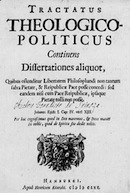
Source: Theologico-Political Treatise - Chapter IV - of the Divine Law
Spinoza's Chapter 4. – the search for knowledge is more important than Biblical injunctions (Page 7)

Spinoza turns his attention to the story of the fall from Eden. He sees in Adam's breaking of the commandment not to eat of the fruit of the tree of knowledge of good and evil as a positive commandment to seek the good for its own sake, not from fear of evil.
He goes further and calls this a part of the whole Divine natural law, and absolutely agrees with the dictates of the light of nature;. He says that it would be easy to explain this the story as an allegory but he prefers to pass over this subject in silence because he cannot be sure that his positive interpretation is correct and because many people believe the story as fact.
Spinoza says it is better to trust the Bible's wisdom of Solomon – that the true life consists of obtaining the fruit of understanding and the only punishment is not having it, He considers this interpretation as in agreement with his position that it is the intellect (true understanding) that lays down laws for the wise. He quotes Solomon, "Happy is the man that findeth wisdom, and the man that getteth understanding," for "Wisdom gives length of days, and riches and honour; her ways are ways of pleasantness, and all her paths peace.
Comment:
Well, it is quite a stretch to say the Adam's reaching for the knowledge of good and evil in disobedience of the divine injunction not to was correct. From the modern point of view it is the right thing to do and Spinoza's interpretation makes him a man of our time rather than that of his own.
One suspects that invoking Solomon's words in support of his view was Spinoza's way of reaching out to his contemporaries rather than makng a logical case.